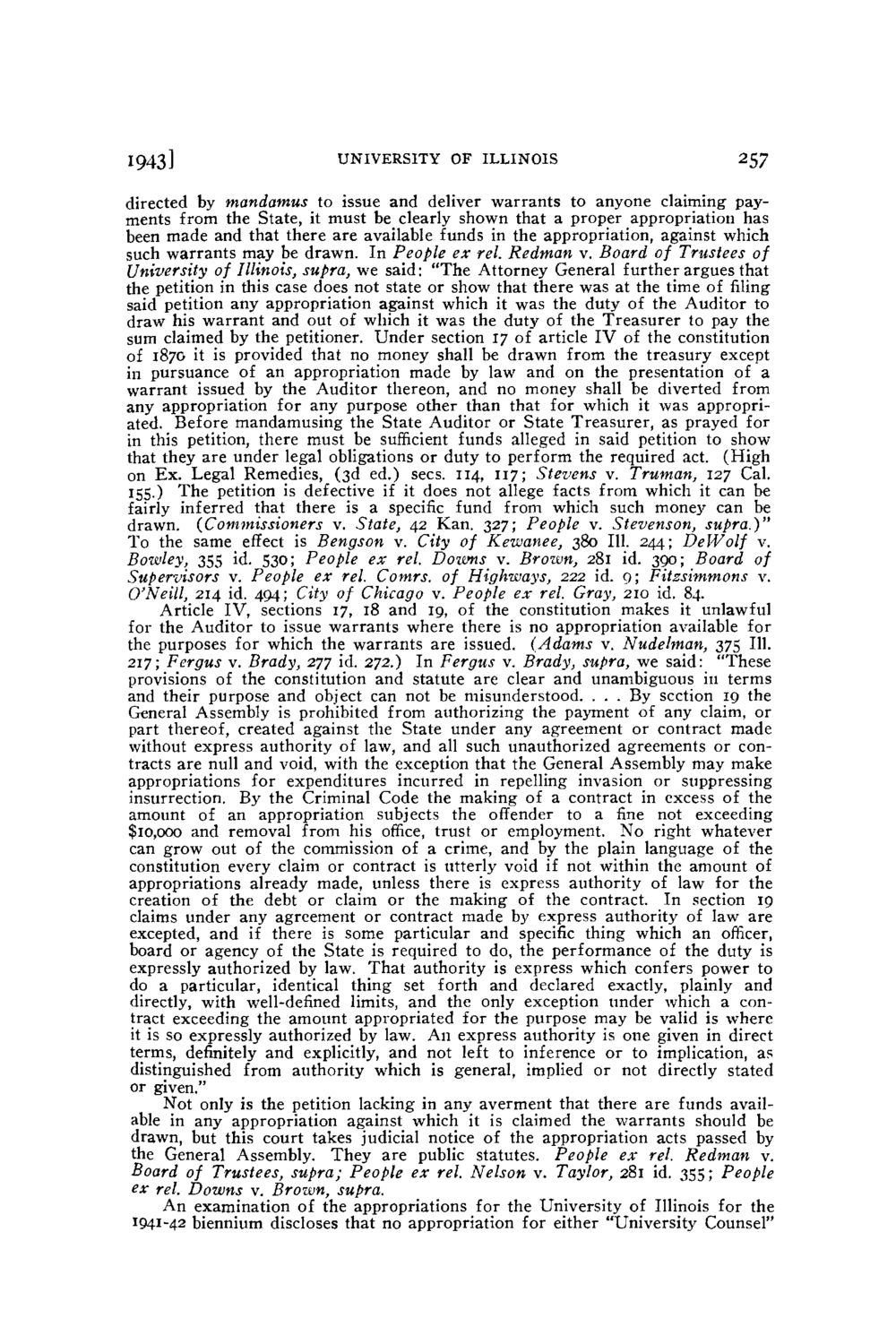| |
| |
Caption: Board of Trustees Minutes - 1944
This is a reduced-resolution page image for fast online browsing.

EXTRACTED TEXT FROM PAGE:
1943] UNIVERSITY OF ILLINOIS 257 directed by mandamus to issue and deliver warrants to anyone claiming payments from the State, it must be clearly shown that a proper appropriation has been made and that there are available funds in the appropriation, against which such warrants may be drawn. In People ex rel. Redman v. Board of Trustees of University of Illinois, supra, we said: "The Attorney General further argues that the petition in this case does not state or show that there was at the time of filing said petition any appropriation against which it was the duty of the Auditor to draw his warrant and out of which it was the duty of the Treasurer to pay the sum claimed by the petitioner. Under section 17 of article I V of the constitution of 1870 it is provided that no money shall be drawn from the treasury except in pursuance of an appropriation made by law and on the presentation of a warrant issued by the Auditor thereon, and no money shall be diverted from any appropriation for any purpose other than that for which it was appropriated. Before mandamusing the State Auditor or State Treasurer, as prayed for in this petition, there must be sufficient funds alleged in said petition to show that they are under legal obligations or duty to perform the required act. (High on Ex. Legal Remedies, (3d ed.) sees. 114, 117; Stevens v. Truman, 127 Cal. 155.) The petition is defective if it does not allege facts from which it can be fairly inferred that there is a specific fund from which such money can be drawn. {Commissioners v. State, 42 Kan. 327; People v. Stevenson, supra.}" To the same effect is Bengson v. City of Kewanee, 380 111. 244; DeWolf v. Bowley, 355 id. 530; People ex rel. Downs v. Brown, 281 id. 390; Board of Supervisors v. People ex rel. Comrs. of Highways, 222 id. 9; Fitzsimmons v. O'Neill, 214 id. 494; City of Chicago v. People ex rel. Gray, 210 id. 84. Article IV, sections 17, 18 and 19, of the constitution makes it unlawful for the Auditor to issue warrants where there is no appropriation available for the purposes for which the warrants are issued. (Adams v. Nudelman, 375 111. 217; Fergus v. Brady, 277 id. 272.) In Fergus v. Brady, supra, we said: "These provisions of the constitution and statute are clear and unambiguous in terms and their purpose and object can not be misunderstood. . . . By section 19 the General Assembly is prohibited from authorizing the payment of any claim, or part thereof, created against the State under any agreement or contract made without express authority of law, and all such unauthorized agreements or contracts are null and void, with the exception that the General Assembly may make appropriations for expenditures incurred in repelling invasion or suppressing insurrection. By the Criminal Code the making of a contract in excess of the amount of an appropriation subjects the offender to a fine not exceeding $10,000 and removal from his office, trust or employment. No right whatever can grow out of the commission of a crime, and by the plain language of the constitution every claim or contract is utterly void if not within the amount of appropriations already made, unless there is express authority of law for the creation of the debt or claim or the making of the contract. In section 19 claims under any agreement or contract made by express authority of law are excepted, and if there is some particular and specific thing which an officer, board or agency of the State is required to do, the performance of the duty is expressly authorized by law. That authority is express which confers power to do a particular, identical thing set forth and declared exactly, plainly and directly, with well-defined limits, and the only exception under which a contract exceeding the amount appropriated for the purpose may be valid is where it is so expressly authorized by law. An express authority is one given in direct terms, definitely and explicitly, and not left to inference or to implication, as distinguished from authority which is general, implied or not directly stated or given." Not only is the petition lacking in any averment that there are funds available in any appropriation against which it is claimed the warrants should be drawn, but this court takes judicial notice of the appropriation acts passed by the General Assembly. They are public statutes. People ex rel. Redman v. Board of Trustees, supra; People ex rel. Nelson v. Taylor, 281 id. 355; People ex rel. Downs v. Brown, supra. An examination of the appropriations for the University of Illinois for the 1041-42 biennium discloses that no appropriation for either "University Counsel"
| |